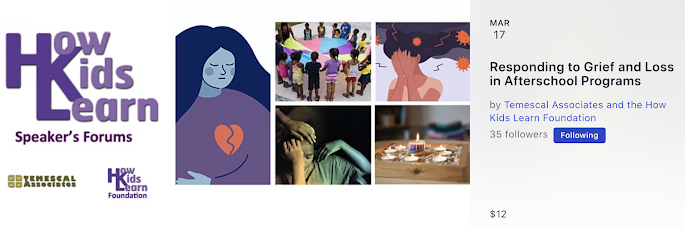There is a growing awareness of the importance of emotional regulation, social emotional learning, trauma informed practice and healing centered engagement. However it is important that we understand more about the needs of youth who are grieving or experiencing loss due to the COVID-19 pandemic (deaths and illness, as well as the loss of “normal”), the opioid crisis, the rising gun violence and the racial violence that is plaguing the country. Below we interview Brittany Collins, author of the book Learning from Loss: A Trauma-Informed Approach to Supporting Grieving Students. We have divided this interview into 2 parts and part 2 will be released next week. (Ms. Collins will be a guest presenter on an upcoming Speaker’s Forum/ Webinar.)
A: I wrote Learning from Loss because, as a formerly bereaved student turned educator, I have always been keenly aware of both the ways in which teachers, coaches, youth workers, and other caring adults can have a lifelong impact on the lives of young people who are grieving, as well as the ways in which adults are often socialized into spaces of discomfort surrounding students’ grief – not knowing what to say, for example, or not wanting to make things worse and thereby slipping into silence.
The question that drove my writing process was, in regards to creating learning environments that are supportive of students who are grieving, “How can we do this better?” I was privileged to interview numerous teachers, social workers, guidance and grief counselors who shed light on the intersections of theory and practice, and to offer snapshots of their stories to readers alongside actionable practices for use with young people.
A: Before the pandemic, we knew that 7 out of 10 teachers had a student in their classroom who was actively grieving. Now, that number has likely risen, as 1.5 million children have lost a primary or secondary caregiver to COVID-19 worldwide, over 140,000 in the U.S. alone, and we are seeing that Black, Indigenous, People Of Color (BIPOC) youth are facing much higher rates of bereavement due to systemic health inequities. Of course, these statistics relate only to grief that is experienced in response to a physical death, but there are many other kinds of losses that can elicit a grief response in our brains and bodies: “living losses” describe things like divorce, a familial falling out, experiences in foster care, a move or change in schooling – transitional losses and absences that are rife in this pandemic moment but that do not involve death.
A: These types of loss are certainly valid examples and can produce physiological grief responses; for example, COVID pandemic fears may take the form of anticipatory grief regarding one’s own or a loved one’s health and/or mortality. But the pandemic has also incited other forms of living losses, like those caused by a lack of proximity to friends and loved ones; grief for our former life/way of living; grief for growth milestones missed, like a prom or graduation, wedding or job transition – “the loss of ‘normal’” is a great way to put it.
(Part 2 of this interview will be released next week.)
Brittany Collins is an author, educator, and curriculum designer dedicated to supporting teachers’ and students’ social and emotional well-being, especially in times of adversity. Her work explores the impacts of grief, loss, and trauma in the school system, as well as how innovative pedagogies—from inquiry-based learning to identity development curricula—can create conditions supportive of all learners. She is the Founder of Grief-Responsive Teaching, a professional learning community and resource hub that supports students' and educators' well-being in times of loss.










No comments:
Post a Comment